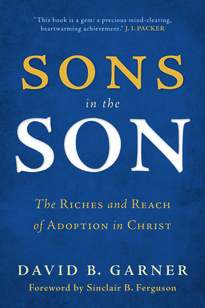Book Review: Sons in the Son
 This month I had the opportunity to read Sons in the Son: The Riches and Reach of Adoption in Christ, by David B. Garner. I was first interested in the book because it covers a topic that I have not read much on, and it is a topic that is rarely addressed in depth—our adoption in Christ.
This month I had the opportunity to read Sons in the Son: The Riches and Reach of Adoption in Christ, by David B. Garner. I was first interested in the book because it covers a topic that I have not read much on, and it is a topic that is rarely addressed in depth—our adoption in Christ.
About the Author
David Garner got his ThM at DTS and his PhD at Westminster. He is now the Associate Professor of Systematic Theology at Westminster, and is an ordained elder in the Presbyterian Church in America (PCA). One thing I really appreciate about Garner is his obvious desire to wed good scholarly work with the needs of the Church. He has accomplished this union in the welcome resource, Sons in the Son.
Layout of the Book
The first thing of note is that for a book on one topic (adoption), the book is quite large (366 pages of content). The content of the book comes largely from Garner’s 2002 PhD dissertation on adoption, although it does not necessarily read like a stuffy dissertation. It is quite readable while also retaining an academic quality (the book is heavily footnoted with helpful citations).
The book is divided into three parts. The first part deals with the issues of hermeneutics, history, and etymology within the discussion of adoption. This is helpful because Garner gives clear indication of how he will study the subject, and the methodology he will use. Garner advocates for a contextual study of adoption, which means the book includes thorough examinations of passages pertaining to adoption.
The second part of the book is an exegetical and theological survey of the important passages involved in the discussion. These passages include Eph 1:3-6, Gal 4:4-7, and three occurrences in Rom (8:15-17; 8:22-23; 9:3-5). The second part of the book takes up a significant portion of material as it is the main support for much of the detail Garner is trying to lay out.
The third and final part of the book is an examination of adoption in biblical and systematic theology. In this section of the book, Garner discusses some historical matters (creedal affirmations of adoption, etc.), as well as the implications of adoption in various fields of theology (e.g., Ordo Salutis).
The layout of the book moves naturally from methodology to textual considerations, and from textual considerations to application. It is clear that the logical flow of thought is a reflection of the clear thinking of the author.
Significant Takeaways
I am unable to list everything (obviously), but one of the main things that Garner does well in this book is to highlight the Trinity’s concurrent work in redemption. Garner makes it clear through His study that God, the Holy Spirit, and the Son are all involved in the adoption process—which, on the basis of Christ’s work, secures redemptive benefits for the believer. Often this is an assumed point in theological discussion, but Garner gives weighty arguments to these propositions.
Theological Differences
Despite the high quality of work which Garner puts into his book, there are times I disagree with some of his observations and conclusions. The disagreements do not flow from the quality of the work itself, but rather from Garner’s embracing of covenant theology. Being a dispensationalist, I disagree with many of the presuppositions underlying covenant theology. For example, Garner presupposes the Covenant of Grace as an underlying theme of Ephesians 1. However, I side with those who do not see an overarching Covenant of Grace in Scripture at all, and thus I differ on some of the minor conclusions in his exegetical work.
Now, I understand in a significant work like this Garner cannot be expected to defend covenant theology and make significant contributions to the topic of adoption. So, I do not consider this an vital point, but it is worth noting as many of my friends who may wish to buy this book should be aware that Garner approaches the issue with a slightly different view of covenant operations. I do not think this disqualifies the book from being helpful, but as with every topic, the presuppositions we hold influence some of our conclusions.
Concluding Thoughts
Garner provides stimulating research and a thorough discussion on an important (though oft neglected) subject for the Church. It is not a light weight material as it is meant to engage in a hearty discussion on the topic of adoption. This is not meant to be a “quick read” per se, but meant to facilitate deep thoughts on deep issues. As it stands, Sons in the Son is a significant work from the Reformed tradition on the concept of adoption and how that impacts Reformed theology.
Thanks to P&R Publishing for the review copy. I trust this brief review will be helpful to those considering buying this book.